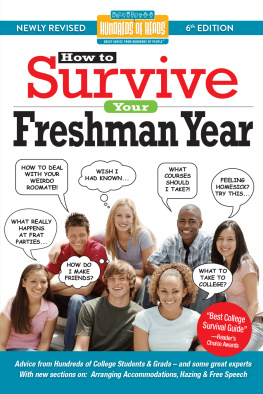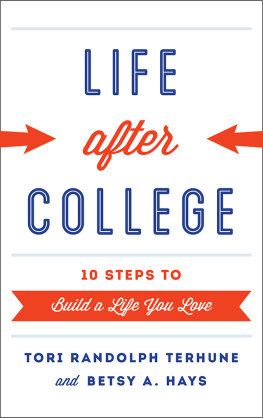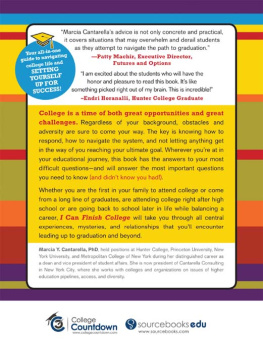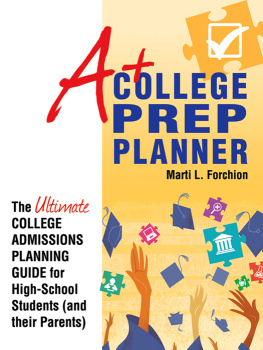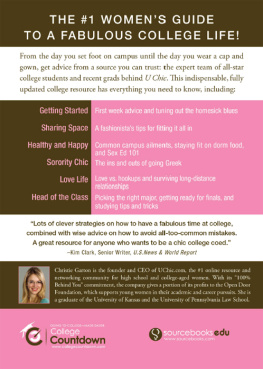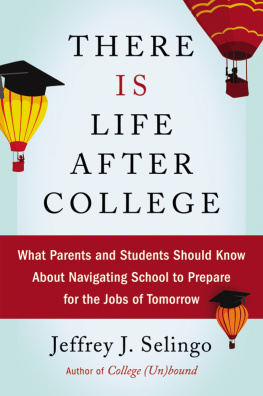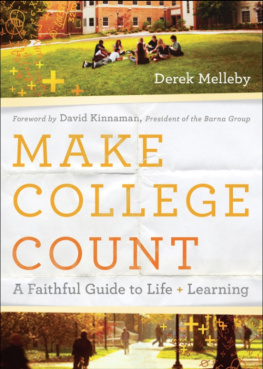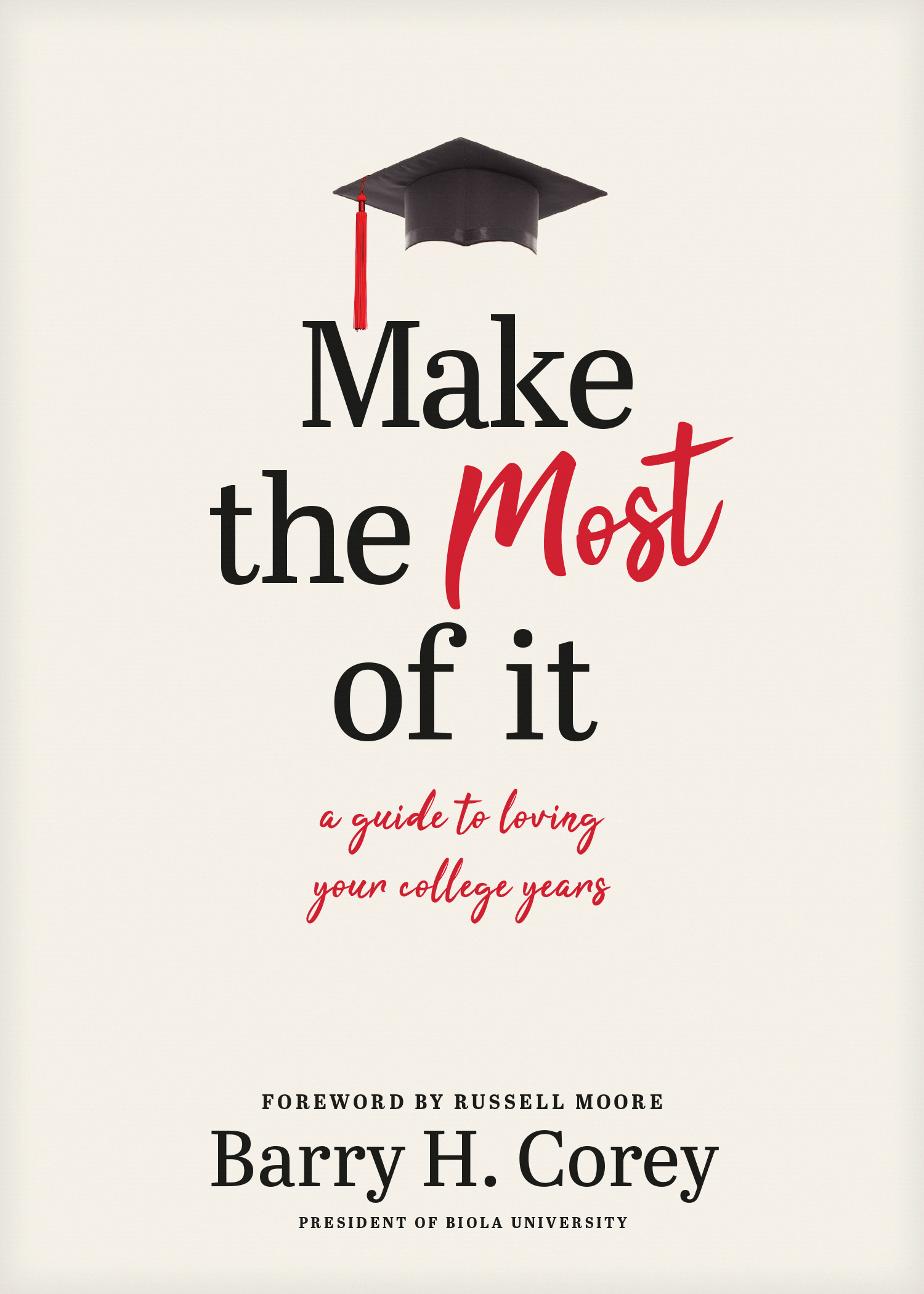Visit Tyndale online at www.tyndale.com.
Visit Tyndale Momentum online at www.tyndalemomentum.com.
TYNDALE, Tyndales quill logo, Tyndale Momentum, and the Tyndale Momentum logo are registered trademarks of Tyndale House Publishers, Inc. Tyndale Momentum is the nonfiction imprint of Tyndale House Publishers, Inc., Carol Stream, Illinois.
Make the Most of It: A Guide to Loving Your College Years
Copyright 2020 by Barry H. Corey. All rights reserved.
Cover photograph of graduation cap copyright tomwang/Depositphotos.com. All rights reserved.
Cover photograph of graduation tassel copyright mdorottya/Depositphotos.com. All rights reserved.
Designed by Ron C. Kaufmann
Edited by Jonathan Schindler
Published in association with the literary agency of WordServe Literary Group, www.wordserveliterary.com.
All Scripture quotations, unless otherwise indicated, are taken from the Holy Bible, New International Version, NIV. Copyright 1973, 1978, 1984, 2011 by Biblica, Inc. Used by permission. All rights reserved worldwide.
Scripture quotations marked NLT are taken from the Holy Bible, New Living Translation, copyright 1996, 2004, 2015 by Tyndale House Foundation. Used by permission of Tyndale House Publishers, Inc., Carol Stream, Illinois 60188. All rights reserved.
For information about special discounts for bulk purchases, please contact Tyndale House Publishers at , or call 1-800-323-9400.
Library of Congress Cataloging-in-Publication Data
Names: Corey, Barry H., author.
Title: Make the most of it : a guide to loving your college years / Barry H. Corey.
Description: Carol Stream, Illinois : Tyndale Momentum, the nonfiction imprint of Tyndale House Publishers, Inc., [2020] | Includes bibliographical references.
Identifiers: LCCN 2019034358 (print) | LCCN 2019034359 (ebook) | ISBN 9781496436580 (hardcover) | ISBN 9781496436597 (kindle edition) | ISBN 9781496436603 (epub) | ISBN 9781496436610 (epub)
Subjects: LCSH: College student orientationUnited States. | Christian college studentsUnited StatesConduct of life.
Classification: LCC LB2343.32 .C67 2020 (print) | LCC LB2343.32 (ebook) | DDC 378.1/98dc23
LC record available at https://lccn.loc.gov/2019034358
LC ebook record available at https://lccn.loc.gov/2019034359
ISBN 978-1-4964-3660-3 (ePub); ISBN 978-1-4964-3659-7 (Kindle); ISBN 978-1-4964-3661-0 (Apple)
Build: 2021-04-21 22:30:58 EPUB 3.0
To my wife, Paula
My standard for all things excellent, lovely, and good
and
To the memory of my brother-in-law Ossie Mills
A university leader and an inspiration to friends and strangers
and
To Robert E. Cooley
My mentor
Foreword
If youre in college right now, youre in crisis. If youre looking to start college, youre facing a crisis. But maybe its not a crisis in the way that you might think of that word.
Several years ago, someone explained to me the concept of Rumspringa, or running around, which is practiced in some communities of Amish and other religious groups. Late in adolescence, young men and women leave the community of faith in which theyve grown up and experience life on the outside. Sometimes that includes experiences as benign as watching television or moviegoing, maybe smoking cigarettes, and in other cases, it could include the sort of riotous living Christians associate more with the prodigal son in Jesus parable. The idea is that, after all of this, these young people know what it is to commit, out of their own free will, to the life of holiness and world-denial that makes up their religious traditions way of life. The Rumspringa concept made immediate sense to me because it reminded me of what in my own southern evangelical tradition was called the college and career Sunday school class.
The college and career Sunday school class was reserved for those who were now out of high school and thus out of the traditional evangelical youth ministry, whether they went to college or not. In many congregations, the college and career class was actually less an evangelical Rumspringa and more a Protestant version of limbo. Thats because the group was a sort of holding pattern: too old for youth group but too young for the newly marrieds class. Although this category did technically exist, there was either no one in the class or no clear purpose for it.
And that, in essence, left high school graduates in Christian churches in a type of limbo, a period in their lives when theyd drift out to sea and hopefully learn to swim back to shore. For a long time, some sectors of North American Christianitywith many blessed and effective exceptionsalmost expected students to drift away from Christ and the church for a few years after high school.
It seems to me those days are over. Thats both bad and good news.
The bad news is that churches cannot expect that those who drift away will come back. For one thing, what usually prompted such a homecoming to the church was a pattern of life changes related to family formation, like getting married or having children. These decisions are now happening much later in young peoples life span, after habits are more clearly formed.
The good news is that the gospel is no longer assumed as part of a life cycle, which means the gospel can be the real gospel, a union with Christ that reconciles sinners to God and then transforms them into his likeness. And where churches at one time worried that those going off to college would lose their faith, it seems to me that the place where the Spirit is most at work right now is often on college and university campuses.
Graduating from high school can begin your crisis years, and crisis is not necessarily negative. Crisis is a time of sorting out what really matters to you, who you really are. Many students come to know Christ during this time, and many who know Christ come to see the implications of what it means to follow Jesus with the rest of their lives. That should elicit from all of usstudents and parents alikeexcitement and gratitude.
Thats why the book you hold in your hands is important, not just to a college student like you and to those who know and love you, but to the entire church. I can think of no one more in touch with both the deep wells of Christian thought and practice and the lived realities of university students than Barry Corey. Barry Corey is one of the most thoughtful leaders among global evangelical Christians, and he also has built one of the most dynamic Christian college campuses in the world, where students are intellectually equipped and also spiritually formed. On this campus, students are clearly growing in mind, skill, heart, and psyche toward a holistic vision of following Christ.
In this book, President Corey invites you, in whatever setting you find yourself, to benefit from his wisdom and experience in how to navigate the crisesthe turning pointsof college life. Some of those crises are seemingly monumental and others seemingly microscopic, which can be difficult even at the level of telling the one from the other. So read this book slowly. Think about the counsel you receive here. Pray about it, and make notes for yourself. Whether college exhilarates you or terrifies you, you are in a time of crisis that can deeply change you, setting you free to seek first the Kingdom and to point to the life found in Jesus Christ. Thats a crisis worth having. Make the most of it. Were counting on you.


